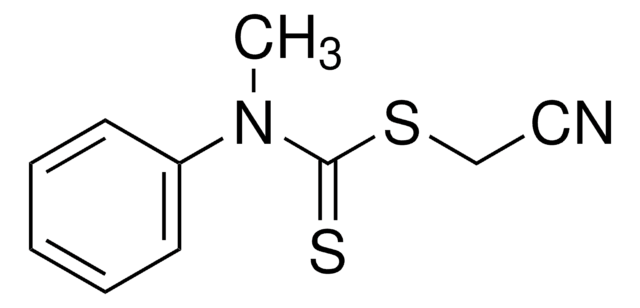736236
2-Cyanopropan-2-yl N-methyl-N-(pyridin-4-yl)carbamodithioate
97% (HPLC)
About This Item
Productos recomendados
assay
97% (HPLC)
form
solid
mp
97-102 °C
storage temp.
2-8°C
SMILES string
CN(C(=S)SC(C)(C)C#N)c1ccncc1
InChI
1S/C11H13N3S2/c1-11(2,8-12)16-10(15)14(3)9-4-6-13-7-5-9/h4-7H,1-3H3
InChI key
PYVIBYAVTHICFS-UHFFFAOYSA-N
Application
signalword
Danger
hcodes
pcodes
Hazard Classifications
Resp. Sens. 1 - Skin Sens. 1
Storage Class
11 - Combustible Solids
wgk_germany
WGK 3
flash_point_f
Not applicable
flash_point_c
Not applicable
Certificados de análisis (COA)
Busque Certificados de análisis (COA) introduciendo el número de lote del producto. Los números de lote se encuentran en la etiqueta del producto después de las palabras «Lot» o «Batch»
¿Ya tiene este producto?
Encuentre la documentación para los productos que ha comprado recientemente en la Biblioteca de documentos.
Los clientes también vieron
Artículos
Universal (Switchable) RAFT agents allow for the polymerization of both less activated and more activated monomers and are ideal for the synthesis of well-defined block copolymers.
RAFT polymerization uses commercial agents to control polymer properties without cytotoxic heavy metals like ATRP.
The modification of biomacromolecules, such as peptides and proteins, through the attachment of synthetic polymers has led to a new family of highly advanced biomaterials with enhanced properties.
Micro review of reversible addition/fragmentation chain transfer (RAFT) polymerization.
Protocolos
We present an article about RAFT, or Reversible Addition/Fragmentation Chain Transfer, which is a form of living radical polymerization.
We presents an article featuring procedures that describe polymerization of methyl methacrylate and vinyl acetate homopolymers and a block copolymer as performed by researchers at CSIRO.
Polymerization via ATRP procedures demonstrated by Prof. Dave Haddleton's research group at the University of Warwick.
Nuestro equipo de científicos tiene experiencia en todas las áreas de investigación: Ciencias de la vida, Ciencia de los materiales, Síntesis química, Cromatografía, Analítica y muchas otras.
Póngase en contacto con el Servicio técnico










![4-Cyano-4-[(dodecylsulfanylthiocarbonyl)sulfanyl]pentanoic acid 97% (HPLC)](/deepweb/assets/sigmaaldrich/product/structures/204/925/30ae6ca0-5b0b-4963-a061-7e5e3d1a85af/640/30ae6ca0-5b0b-4963-a061-7e5e3d1a85af.png)
